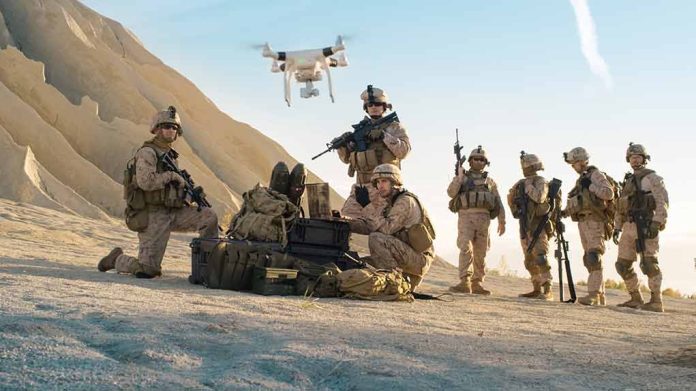
Russia’s shadowy Africa Corps has quietly replaced the infamous Wagner Group in Mali, maintaining Moscow’s grip on the terrorism-ravaged nation despite international outcry over continued human rights abuses and growing jihadist attacks.
Key Takeaways
- The Kremlin-controlled Africa Corps has officially replaced the Wagner Group in Mali, continuing Russia’s military presence following Wagner leader Yevgeny Prigozhin’s death in August 2023.
- Mali’s ruling junta, which seized power through coups in 2020 and 2021, abandoned its long-standing French alliance in favor of Russian military support, forcing France to withdraw its troops in 2022.
- Human rights groups report continued abuses under the new Russian presence, including a UN-documented massacre of 500 civilians in March 2022 allegedly involving Wagner mercenaries.
- Despite Wagner’s withdrawal amid heavy losses against jihadist groups, approximately 2,000 Russian operatives remain in Mali with the Africa Corps now operating under direct Russian defense ministry control.
- The transition to Africa Corps signals Russia’s strategic commitment to maintaining influence in Africa as Western powers retreat from the region.
Moscow’s Military Footprint Continues Through New Entity
The withdrawal of the Wagner Group from Mali has not diminished Russia’s military presence in the West African nation. Instead, the Kremlin has smoothly transitioned control to the Africa Corps, a paramilitary organization directly commanded by the Russian defense ministry. Security sources in the region confirm the handover is complete, representing a reshuffling of Moscow’s pieces on the African chessboard rather than a retreat from its strategic interests.
The transition follows the August 2023 death of Wagner founder Yevgeny Prigozhin in a mysterious plane crash, which came shortly after his failed mutiny against Russian military leadership. Before departing, Wagner channels announced their mission complete with the message: “Mission accomplished. PMC Wagner is going home.” Yet this withdrawal appears more organizational than operational, as Russian military objectives in Mali remain unchanged.
Mali’s Shift From French to Russian Military Support
Mali’s ruling military junta, which seized power through consecutive coups in 2020 and 2021, has deliberately pivoted from its traditional Western allies toward Moscow. This realignment gained momentum when the junta expelled French forces in 2022, ending a decade-long counterterrorism partnership. The deterioration in Franco-Malian relations created a security vacuum that Russia eagerly filled, first through Wagner’s mercenaries and now via the Africa Corps.
“Since the death of Prigozhin, Russia has had this whole plan to then make the Wagner Group fall under the command of the Ministry of Defense. One of the steps they made was to revamp or introduce the Africa Corps, which is the way in which the Russian paramilitaries would retain a presence in areas where the Wagner group has been operating,” Said Beverly Ochieng.
The Malian government has persistently denied Wagner’s presence, claiming cooperation only with “Russian instructors.” This semantic dance continues with the Africa Corps, highlighting the junta’s sensitivity about appearing dependent on foreign fighters while struggling to contain a decade-long insurgency by al-Qaida and Islamic State-affiliated groups throughout the country’s vast territory.
Human Rights Concerns Persist Under New Russian Management
The Wagner Group’s brutal reputation for human rights violations appears likely to continue under the Africa Corps banner. United Nations investigators previously documented the execution of approximately 500 people in the town of Moura in March 2022, a massacre allegedly carried out by Malian forces with Wagner mercenaries. Human rights organizations fear the Africa Corps will maintain similar tactics while operating under direct Kremlin control.
A Malian security source offered even more direct confirmation of the continuity between the two Russian entities: “Wagner yesterday or Africa Corps today, our point of contact remains the same, it is the central power in Russia, Stated Kremlin.”
Strategic Shift Amid Increasing Jihadist Threat
Wagner’s departure coincides with a resurgence of jihadist attacks throughout Mali, suggesting the group may have withdrawn following significant battlefield losses. Security analysts estimate approximately 2,000 Russian operatives remain in Mali, with the Africa Corps now expected to focus more on training and equipment provision rather than direct combat operations. This shift indicates a possible recalibration of Russian tactics after Wagner’s approach failed to decisively defeat insurgent groups.
“The lack of an official and mutual announcement from both the Malian authorities and Wagner indicate possible internal dispute which led to this sudden decision. Simultaneously, this could point to a new framework for Russian presence in the country,” Said Rida Lyammouri.
As Western influence continues to wane across the Sahel region, with Mali, Burkina Faso, and Niger all experiencing military coups and shifting toward Russian partnerships, Moscow appears committed to maintaining its foothold despite the challenges. The Africa Corps represents the institutionalization of Russian military influence in Africa, moving from the plausibly deniable Wagner model to a more formalized, state-controlled approach that signals Russia’s long-term strategic investment in the continent.



